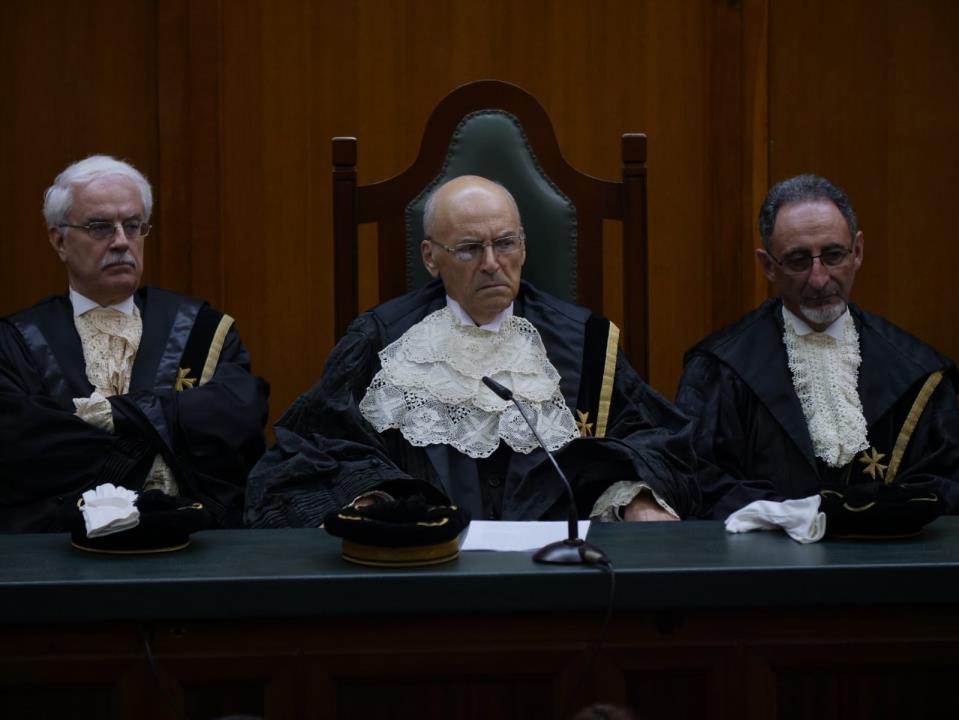Chamber of Advocates President George Hyzler said that he has had what he hopes was the last meeting with the Justice Ministry over a bill which will regulate the legal profession, ironing out the last points of dispute over its creation.
Delivering his speech during the opening of the forensic year, he made certain observations of the legal profession and said that there have been major changes over the years. Traditionally he said, the legal profession was tied to the courts, now, he said, this has changed and only a few practice in court.
He said that the number of graduates exploded. The majority choose not to practice in court.
He said the code of ethics does not change for those who do not work in court, and said that those who do not work in court are also exposed to regulations of other professions but do not have the same ethical codes. This is a disadvantage, he said, mentioning for example, advertising restrictions. Hi hinted at his wish to exclude people who work in business, adding that such people who took their warrant years before cannot and are no longer considered lawyers, and do not need to be tied to professional regulations. He said that business regulations are incompatible with a lawyer’s ethics.
He said that the Chamber of Advocates has been campaigning for the need for regulations of the legal profession, he said, highlighting that lawyers who do not work in court sometimes mix their work with other jobs, with different ethical practices.

He said that he has been, what he hopes was the last meeting with the Justice Minister to iron out points of disagreement, and said that the ball is now in the Attorney General’s court to review the bill and pass it on to cabinet. He expressed his hope that this will not take long.
He went on to speak about a few points present in the proposed bill.
He said that the legal services offered exclusively by lawyers, and what can be offered by other professions, will be defined. This way, he said, certain other professions that are regulated through other authorities will be able to, without breaking the law as happens today, provide certain legal services. He mentioned financial services as an example.
Law firms will be recognised and regulated through this new bill he added, and every lawyer will have to be a member of the chamber of Advocates. He said that it is inconceivable how association within the Bar is not obligatory. As such, a practicing certificate will be issued annually, which will be issued automatically unless there is a legal reason for it not to be continued. This will be different from the warrant.
The Chamber of Advocates will be responsible for this practicing certificate.

The obligation for continuing professional development will also be introduced, he said. In addition, basic obligatory professional indemnity will alos be introduced. He said that in todays world, an error made could see major financial consequences for a lawyer and their families.
He said that the Albo for Advocates will be formally created and kept at the Chamber.
Lastly, he mentioned that the Executive will be given certain powers as per the responsibilities for the Chamber, and that the State’s roll will be to regulate the Chamber, and ensure it operates properly.
He said that the Chamber has commissioned a firm to create a blueprint as for where the profession should head in the coming years.
Turning to statistics, he said that while less cases were introduced in 2017 than 2012, fewer cases are being decided. He highlighted that this was the case in the Civil courts as well as in tribunals.
On the introduction of court attorneys, he said he is pleased with how they are working out, but stressed the need to look to the statistics as the numbers are not making sense, adding that this phenomenon, that less cases are being decided, must be looked into.

Some lawyers using breach of fair trial to delay justice - Chief Justice Joseph Azzopardi
Chief Justice Joseph Azzopardi also delivered his speech and mentioned the appointment of new judges and magistrates over the past years. He also said that it was good that the newly appointed Judges were originally magistrates.
He spoke about the recently introduced new system of appointment for members of the Judiciary, going through a committee. He said that one must begin to consider how the system could be improved, as there have been situations were the applicant would not have anything which is censurable in his or her life, but the Committee finds it difficult to recommend the appointment for other reasons.
He commented on peoples reaction when a person is appointed to the judiciary, and said that everyone appointed takes an oath where they pledge loyalty to the Republic and the Maltese people. “I am certain that every one of us took this oath with the seriousness it deserves.”
He said that his has absolute trust in his colleagues.
Turning to advocates, he aired his disappointment at the “small number” of lawyers who do everything so that a case never ends, even after a final verdict by the Court of Appeal. He said that recently, it has become a fashion for the lawyer of the losing party to, after the case having taken years, ask for the case to be heard from scratch. When this is refused, he said, the lawyer suddenly says that their right to a fair hearing was breached and propose a Constitutional case.
If they lose again, he said, they would appeal to the EU court. He said that when this occurs, it causes harm to the other party who would need to wait even longer for justice, while also wasting the courts time. Because of this, other cases take longer to decide as well, he said. Such actions he said, should result in the suspension of the lawyers warrant, as happens elsewhere.
He said that in by three years time, nine members of the judiciary will be retired. He said that there must be a plan for this in the future. Currently, he said, a member of the judiciary retires and then a length of time passes before a new one is appointed.
He said that he knows some have mentioned the possibility of raising the retirement age in the past in order to at least not lose the contribution of people who are still able to serve. This, he said, could also serve to allow for a more long-term plan with regards to the substitution of those who retire. “Naturally similar amendments would require a two-thirds vote in Parliament.”